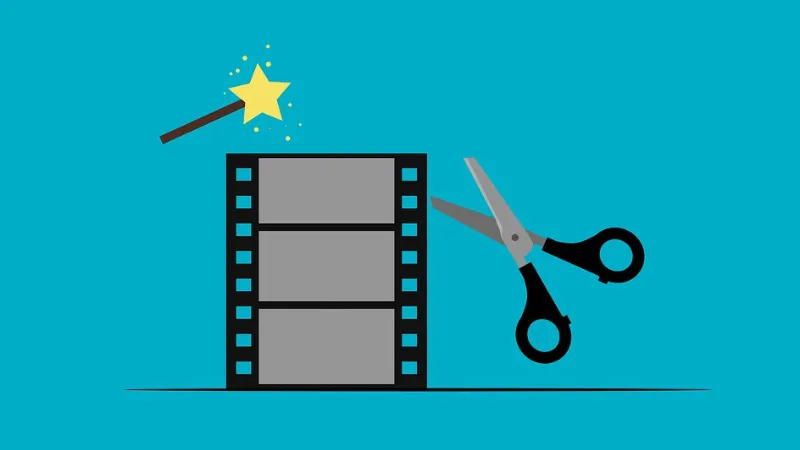A video editor can be an exciting prospect for people who are tech-savvy with a keen eye for both the big picture and little details. So, is video editing a good career?
Yes, video editing is a good career. The U.S. job market for video editing is expected to grow at one of the fastest rates. In comparison to all other media technician and operator jobs, the Bureau of Labor Statistics predicts that employment in the field of film and video editing will increase by 14% between 2021 and 2031.
Learn more about everything video editing in the following paragraphs, including the education and experience needed to enter the field, the demand for film editors, and industry insider knowledge.
Table of Contents
What Do Video Editors Do?
Video editors put together footage and cut it in captivating, entertaining, and visually appealing ways. They choose the cuts, audio, and graphics that best convey a video’s story and turn the director’s vision into a finished product using their creativity and technical expertise. They might edit videos for:
- Film, TV, and animation
- Broadcast productions
- Marketing and advertisements
- Social media content creators

Is Video Editing a Good Career?
Screens are commonplace, and everyone has a device in their hand. There has never been a better time to work as a video editor than now, when there is a record-breaking demand for video.
We’ll explain why this is the ideal time to train as a video editor and how you can capitalize on the enormous demand for video content in the market today.
No More Cost Barriers
A very expensive career, video production and post-production required tens of thousands of dollars in hardware and software. All of the footage was shot on tape or film, requiring pricey decks and film transfer technology, and Avid systems required specialized setups and Linux boxes.
The process and industry have been completely decentralized by the internet and digital video. Film and video tape formats have given way to digital formats that can be transferred on hard drives and over the internet, and video editing software like DaVinci Resolve is free to use.
It’s simpler than ever to pick up a laptop, download the necessary software for free, and get started if you want to work in the video editing industry.
Steep Learning Curves Are Gone
Until recently, learning how to use the software and the complexities of digital media was the most difficult aspect of video editing. Due to the complexity of video, you essentially had to work your way up as an apprentice within the industry before you could even touch an editing station and start editing yourself.
Now, however, the internet is flooded with expert tutorials covering both the artistic and technical sides of video editing. Millions of hours have been spent perfecting the art of video editing on websites like YouTube.
You can download tutorials or templates from other websites, like Motion Array and Envato, to analyze and reverse-engineer the project files of existing projects and learn how professionals create their own creations.
There is Work Aplenty
Once upon a time, television was the only place to watch videos. Additionally, you were limited to producing commercials unless you were producing high-end broadcast television.
However, these days it seems impossible to turn without encountering a screen with video. There are plenty of opportunities for job seekers in the industry thanks to the thousands of television channels, streaming services, social video ads, and influencer videos.
There are job openings for video editors with advertising agencies, businesses, social media platforms, and freelance websites like Upwork, Fiverr, and others.
Video Editors Can Work from Anywhere
To market their goods and services, brands, companies, and organizations need video content. As a result, there is a high demand for video editors. The good news is that video editors can create content from anywhere, not just where their clients are.
The majority of editors can complete their work off-site and deliver it to their clients remotely without ever having met them in person thanks to high-speed internet and digital video formats. Both in terms of lifestyle and creativity, this offers a staggering amount of freedom.

Qualifications for a Job in Video Editing
You must learn to use digital editing and animation tools if you want to work as a video editor. A background in photography is also advantageous. You will also need effective communication abilities, the capacity to narrate stories with interest and timing, attention to detail, and the capacity to meet deadlines.
Knowing how social media and digital marketing work is another essential qualification for the majority of video editors. With 60% of businesses using video as a tool for marketing and 94% intending to keep doing so, marketing videos on social media are becoming more and more popular. Additionally, video is being used more and more in operational, managerial, customer service, and human resources areas of businesses.
Career Paths for Video Editors
Many video editors begin their careers as independent contractors before moving into positions as they gain expertise. These are a few of the career options for video editors.
Film Editor
In a movie studio, a film editor performs post-production work. According to the director’s intent, the editor selects raw footage clips to tell a story. Film editors use a storyboard to select the best clips and order them properly while paying close attention to the consistency of the footage. When they have a project to complete before the studio deadline, film editors frequently put in long shifts for short periods of time.
A film editor’s career path frequently starts with an internship or an apprenticeship. You can become an assistant editor or senior editor as you gain more experience. Some film editors decide to transition into directing.
TV Studio Editor
Television video editors must be able to edit footage quickly in order to meet the deadline for scheduled newscasts. Compared to film editors, they typically work more consistent hours. Editors for television have jobs that are comparable to editors for movies. As you show your abilities and dependability, you will advance from being an assistant to having more authority.
Event Video Editor
Photographers for event video editors capture footage at celebratory occasions like weddings, graduations, and anniversaries. In order for clients to treasure the memory of their special day, they pick the best clips and put them together into a sequence. Event videographers frequently work on their own. Some people work in this field for the rest of their lives, while others use it as a means of landing a position with an advertising agency or studio.
Web Video Editor
Web video editors have the option of working for a client or producing their own content. A career in video editing can be launched with this frequently freelance work. An ongoing position with a marketing agency or video production company can occasionally result from this type of editing.
If you decide to work for an organization, you will likely begin as an editorial assistant and advance to the position of senior editor. You might decide to make a slight career change and transition into the positions of project manager or creative director.
Broadcast Engineer
Even though this isn’t technically a video editing position, many Editors are skilled with audio editing software, so this is another possible career path. Broadcast engineers can work on radio programs and podcasts, correct sound in movies and videos, and create special sound effects.

Training to Become a Video Editor
Aside from the creation of movies and television shows, many businesses that use videos for training and advertising are expanding quickly. One of the best ways to train for a career change to become a video editor is to enroll in classes.
When learning new material, some people prefer taking in-person classes, but that isn’t always possible. A real-time, remote instructor can answer your questions and take over your monitor with your permission to demonstrate how to do things in live online classes, which have a similar setup. Weekdays, weeknights, and weekends are all available for part- or full-time training.
Enrolling in a bootcamp or certificate program is the best way to get ready for a career change into a technical field, like video editing. These are lengthy training programs that cover video editing in much more detail than tutorials can. They last anywhere from a few weeks to a few months. You will leave class with a sample video portfolio of professional quality that you can show to potential employers, which is another benefit of the training.
Is It Easy to Get a Job as a Video Editor?
Demand is high: With 86% of businesses using video for marketing, there is an all-time high demand for video editors. There are more than 28,000 film and video editors working today, most of whom are employed in California or New York, according to the U.S. Bureau of Labor Statistics. For their creative content, many networks and businesses employ in-house editors, and platforms for independent contractors like Upwork and Fiverr give editors the opportunity to collaborate with both businesses and freelancers.
Experience counts, so consider working as an assistant editor while you’re advancing to the position of editor. There is a valuable “learning curve that happens when you are an assistant editor around other editors,” says This can help you gain a better understanding of editing software and how other editors utilize various shots and cuts.
You might be wondering if video editors can work remotely. In most cases, the answer is yes. If you have the appropriate software, you can perform the majority of editing tasks from home and communicate with clients. However, remote work might not be practical if you’re working on a production that requires technology that your typical home setup can’t support, like 4K resolution or high-definition surround sound. In those circumstances, you will need to use a professional editing suite.
Read about
Final Thoughts: is Video Editing a Good Career?
The employment outlook for aspiring video editors is fantastic and is expanding at a rate that is equal to or faster than that of the major video and streaming services. A talented video editor is behind each project you see on Netflix and YouTube. If you receive the right training and acquire the necessary skills, you will never be short of work. Attending a formal education program is the best way to learn the necessary skill set. Industry experts who are aware of what future employers want to see create curriculum from the ground up. Given how significant these programs have grown, formal education is unquestionably a tool you should use to launch your career.



